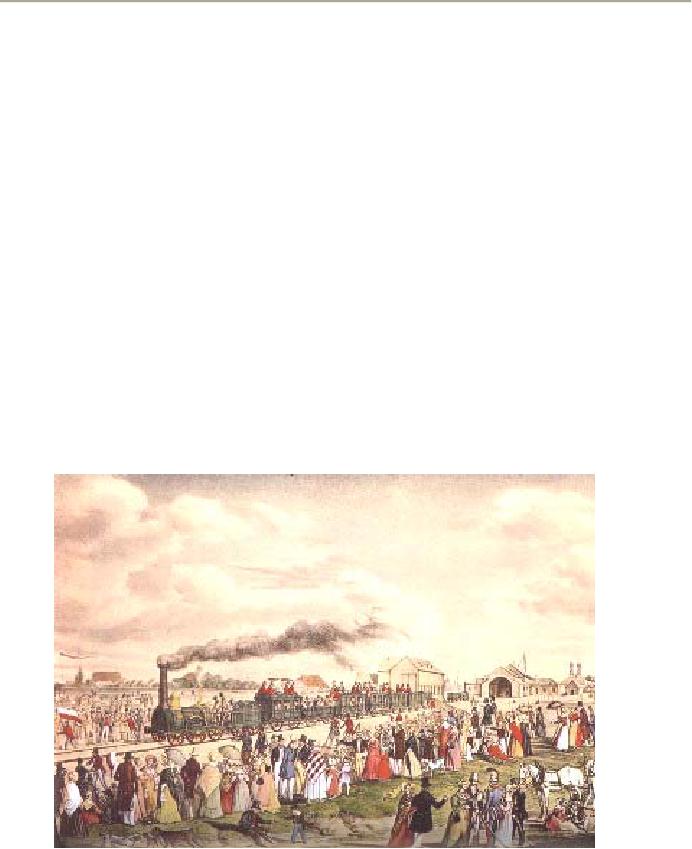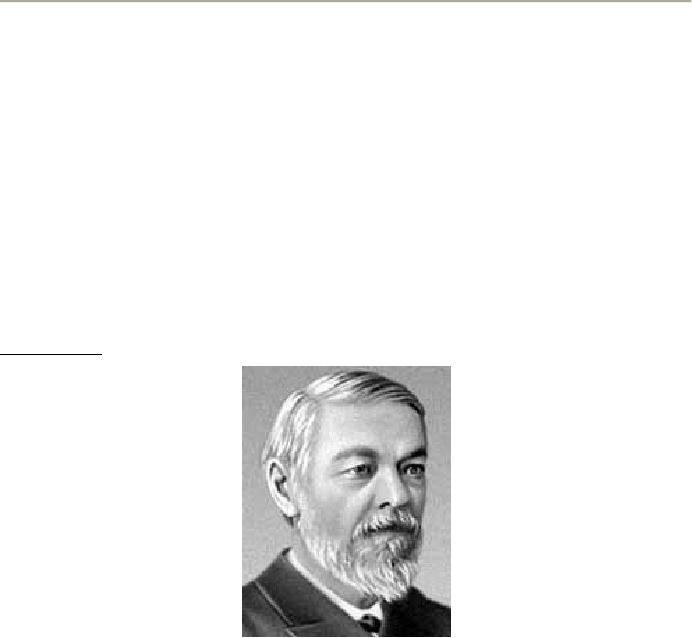 |
INDUSTRIAL REVOLUTION:RUSSIAN CONTRIBUTIONS |
| << GERMAN CONTRIBUTION:Wilhelm Liebniz, Immanuel Kant, Friedrich Hegel |
| RUSSIAN CONTRIBUTIONS:Ivan Pavlov, Reflex, Acquisition >> |

History
and Systems of Psychology
PSY502
VU
Lesson
10
INDUSTRIAL
REVOLUTION
Perhaps
the most important development in the
last one thousand years
was the Industrial
Revolution
of the late 18th and 19th
centuries. This
was the real beginning of
our modern world. Its
main
features
were:
Hand
to machine manufacture
·
Home
to factory production
·
Natural
power to mechanical power
·
It
was also characterized by a movement of
people from villages to new
industrial cities and
the
rapid
development of transport.
The
steam engine was the heart
of industrial revolution. The
first really practical
engine was
invented
by the Scotsman James Watt in about
1775. For the first time in
history, people did not have
to
rely
on human or animal muscle,
wind or water, for power.
Very quickly the steam
engine was being used
for
many things other than
powering textile machines. It
was used to pump water
from coal mines; to
lift
trucks
of coal to the surface; to blow air
into furnaces for making of
iron; to grind clay for
pottery, and to
power
new factories of all kinds.
For over a hundred years,
steam was the king of the
industry.
Steam
Engine being used for
transportation
The
rate, at which new inventions
were made, accelerated. The
industrial Revolution consisted,
in
some
respects, of a chain reaction.
The construction of machines required
more iron; more iron
required
more
coal; more coal required
faster and more efficient
transport; more transport required engineering
skills
of
all kinds. The manufacture of
larger quantities of textiles, for
example, needed more
chemicals; new
chemicals
needed more scientists;
scientist needed more
specialized education.
23

History
and Systems of Psychology
PSY502
VU
Large
numbers of workers had to move to
new towns from countryside:
they needed transport,
housing,
water, sanitation, shops, entertainment, a police force
and general organization. The
increased
amounts
of trading led to the need for
more services such as banking, the post
and later transport
systems.
The
industrial revolution changed England,
and then spread to France,
then affected Germany,
then
Russia and America, then
Japan and then the rest of
the world. Machines replaced
much of the manual
labor,
industry developed and flourished, means
of communication became rapid, electricity was
invented
and
used for commercial purposes
and an industrial class
emerged which replaced
feudalism. New ideas
and
curiosity
were encouraged, and man's
outlook and his attitude
changed.
The
industrial revolution does a
great deal to the modern world
today. The effect of this
revolution
could
be seen immediately on the whole outlook
of man, and it ultimately
affected all the
future
developments
of mankind. Man's outlook became more
empirical and more open towards
new ideas and
innovations.
RUSSIAN
CONTRIBUTIONS
Ivan
Sechenov
Ivan
Sechenov
The
first among the Russian
contributors was Ivan
Sechenov. He was born on
1st August, 1829 and
he
died on 2nd November, 1905. He taught at Moscow
University. Ivan was physiologist,
named by Ivan
Pavlov
as "The Father of Russian physiology."
Sechenov authored major classic "Reflexes
of the Brain"
introducing
electrophysiology and neurophysiology into
laboratories and teaching of
medicine. Sechenov's
major
interest was neurophysiology (the
structure of the brain). He showed that
brain activity is linked
to
electric
currents and was the first
to introduce electrophysiology. His work
laid the foundations for
the
study
of reflexes, animal and
human behavior, and
neuroscience.
Sechenov
explained psychological functions in
terms of physiological responses. This
means that all
psychological
responses of the brain have
some physiological reason or basis. In
other words, when the
brain
acts in a certain manner, it is in
response to certain physiological changes
that have taken
place.
Sechenov
said that the mind and
soul are the functions of the
brain and that there is no
duality
between
soul and the body. Therefore, he
rejected the prevailing view of
soul and the body being
separate
and
accepted the Aristotelian point of
view of unity of body and
soul.
Sechenov
concluded that all
psychological responses are the
result of sensory stimulation
and that
all
psychological responses manifest
themselves in behavioral forms. In other
words, whenever there is
a
change
in the environment, it is received by the
sensory organs of the body
which convey it to the
brain.
The
brain then reacts to these
messages. This reaction of the brain is
manifested in the form of the
behavior
24
History
and Systems of Psychology
PSY502
VU
of
the person. For example when
a person touches a hot
surface, the sensory organs in
his or her skin
transmit
the information to the brain which in
turn sends back the signal
to the body to withdraw
away
from
the hot surface. Therefore, the behavior
of the person is the response to the physiological
change.
Sechenov
also put forward the view
that there are certain
parts in the brain that
augment and
facilitate
certain responses, and are
certain other parts which
inhibit certain responses. We
now know this to
be
true. Sechenov's ideas deeply influenced
the ideas of psychology and
formed the basis of many
new
researches
in the subject.
25
Table of Contents:
- INTRODUCTION:Methodology, Grading, Course Overview up to Midterm
- ANCIENT GREEK PHILOSOPHY/PSYCHOLOGY:Socrates, Plato
- GREEK THINKERS:Aristotle, Contiguity, Contrast
- PSYCHOLOGY IN THE 5TH TO 12TH CENTURY:Saint Augustine, Avicenna
- PSYCHOLOGY IN THE 5TH TO 12TH CENTURY:Al-Ghazali, Ibn-Rushd, Averroes
- RENAISSANCE:Rene Descartes
- ASSOCIATIONISTS:Thomas Hobbes, John Locke
- ASSOCIATIONISTS:David Hume, FRENCH REVOLUTION, Denis Diderot
- GERMAN CONTRIBUTION:Wilhelm Liebniz, Immanuel Kant, Friedrich Hegel
- INDUSTRIAL REVOLUTION:RUSSIAN CONTRIBUTIONS
- RUSSIAN CONTRIBUTIONS:Ivan Pavlov, Reflex, Acquisition
- RUSSIAN CONTRIBUTIONS:Vladimir Bekhterev
- IMPACT OF PHYSICAL SCIENCES ON PSYCHOLOGY:Charles Darwin, Gustav Fechner
- STRUCTURALIST SCHOOL OF PSYCHOLOGY:Wilhelm Wundt
- FUNCTIONALISM:William James, John Dewey
- EUROPEAN FUNCTIONALISTS:David Katz, Edgar Rubin, Jean Piaget
- BEHAVIORISM:Edward Lee Thorndike, Law of belongingness
- BEHAVIORISM:Albert Weiss, Edwin Holt, Learning, Canalization, Walter Hunter
- BEHAVIORISM:J.B.Watson
- NEO-BEHAVIOURISTS:Clark Hull, Edward Tolman, Edwin Gutherie
- NEO-BEHAVIORISTS:B.F. Skinner, Karl Lashley, Donald Hebb, Hobart Mowrer
- GESTALT PSYCHOLOGY:Max Wertheimer, Similarity, Proximity, Closure
- GESTALT PSYCHOLOGY:Wolfgang Kohler, Kurt Koffka, Edward De Bono
- GESTALT SCHOOL AND DYNAMIC PSYCHOLOGY:Kurt Lewin, DYNAMIC PSYCHOLOGY
- HISTORICO-EVOLUTIONARY PSYCHOLOGY:Leon Vygotsky, Sergei Rubenstein
- HISTORICO-EVOLUTIONARY PSYCHOLOGY:Alexei Leontiev, K.M Bykov
- SCIENTIFIC LOOK AT MENTAL DISORDERS
- SCIENTIFIC LOOK AT MENTAL ILLNESS:Philippe Pinel, Sameul Tuke
- SIGMUND FREUD AND THE PSYCHOANALYTIC MOVEMENT:The Superego
- SIGMUND FREUD AND PSYCHOANALYTICAL MOVEMENT:Anna Freud
- CARL JUNG AND ANALYTICAL PSYCHOLOGY:Carl Gustav Jung
- JUNG’S ANALYTICAL PSYCHOLOGY:Carl Gustav Jung
- ALFRED ADLER AND INDIVIDUAL PSYCHOLOGY:Alfred Adler
- NEO-FREUDIANS:Harry Stack Sullivan, Karen Horney
- NEO-FREUDIANS:Karen Horney, Erich Fromm
- ERIKSON and MORENO:J.L. Moreno, Protagonist, Audience, Role playing
- HUMANISTIC PSYCHOLOGY:Abraham Maslow, Carl Rogers, Positive Psychology
- MODERN TRENDS IN PSYCHOLOGICAL TREATMENT
- MODERN TRENDS IN PSYCHOLOGICAL TREATMENT:Biological Approaches
- ANTI-PSYCHIATRY MOVEMENT:D.L. Rosenhan, R.D. Laing, Aaron Esterson
- PSYCHOLOGY IN THE THIRD WORLD:Frantz Fanon
- PSYCHOLOGY IN THE THIRD WORLD CHINA AND PAKISTAN
- PSYCHOLOGY IN THE 21st CENTURY
- PSYCHOLOGY IN THE 21ST CENTURY:Consumer Psychology
- PSYCHOLOGY IN THE 21ST CENTURY:Sports Psychology, Positive Psychology